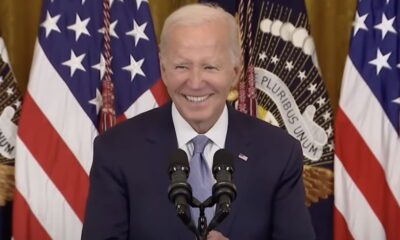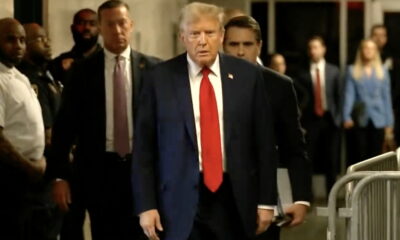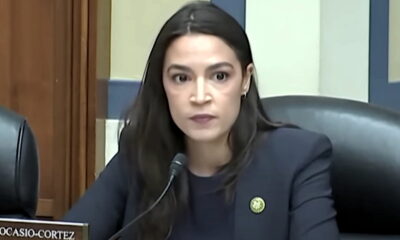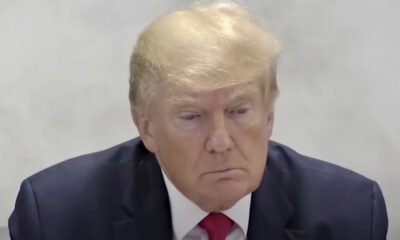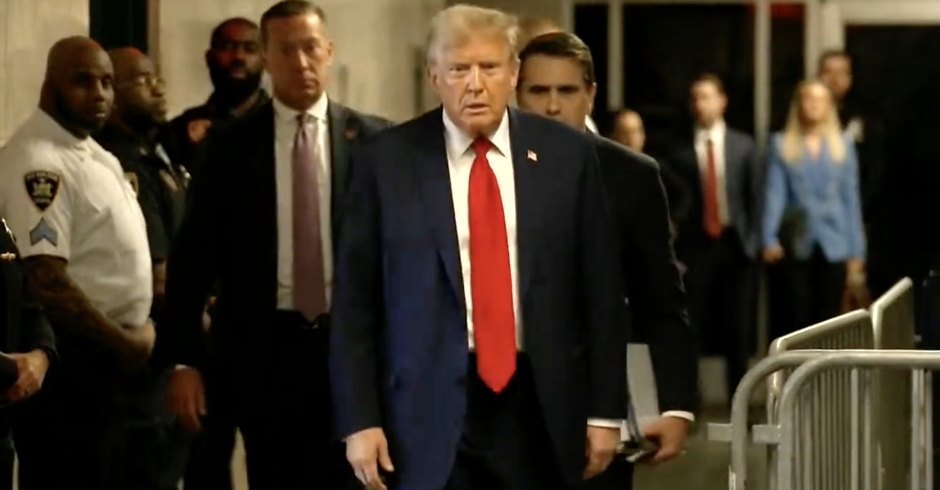News
Nazis’ Lawyers Accuse Charlottesville Victims of Being Communist Sympathizers in Sixth Day of Wild Trial
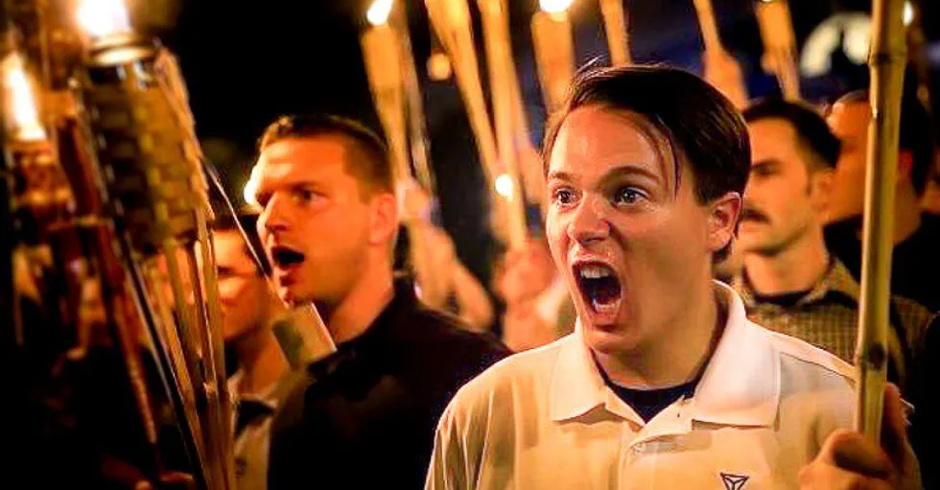
CHARLOTTESVILLE, Virginia — As the second witness in the landmark lawsuit against white nationalist organizers of the 2017 Unite the Right rally took the stand on Monday, defendants sought to discredit the victims of violence that engulfed the city in August 2017 by attempting to make strained connections to violent left-wing counter-protesters and communists.
During jury selection, several prospective jurors expressed negative opinions about “antifa,” revealing how deeply right-wing conspiracy theories falsely portraying left-wing, antiracist activists as uniformly violent have become entrenched since the election of Donald Trump. Lawyers for the plaintiffs were able to get several of the prospective jurors with the most extreme views of “antifa” struck.
Defense counsel began cross-examination of Devin Willis, a plaintiff who was an 18-year-old African-American student at the University of Virginia in August 2017, on Monday morning. Willis and fellow plaintiff Natalie Romero, who testified on Oct. 29, were the only people of color among a group of counter-protesters who were surrounded by a torch-bearing mob as they linked arms around the statue of Thomas Jefferson on the University of Virginia campus on Aug. 11, 2017.
White nationalists in the mob yelled, “Go back to where you came from,” made monkey noises at them, and hurled lit torches at their feet.
A member of the Black Student Alliance at the University of Virginia, Willis helped organize a respite area in nearby McGuffey Park, where antiracist counter-protesters could find food and water, listen to poetry or take time for meditation, during the day of the Unite the Right rally on Aug. 12, 2017.
Defendants questioned him about the language in a press release announcing the project by asking him to distinguish between “nonviolent civil protest” and “direct action.” Through cross-examination, the defendants attempted to cast the respite effort in a sinister light by highlighting the fact that Willis also went to what was then Emancipation Park and stood with a group of people who attempted to block the white nationalists from traversing the street.
Richard Spencer, the one-time figurehead of the alt-right movement, asked Willis if his intention of maintaining a “safe space” at McGuffey Park would “have included blocking people from traveling to a permitted rally.”
“I don’t think so,” Willis replied. “The first thing is the safe space was in McGuffey Park. I think what you’re referring to took place somewhere else.”
But Willis also rejected the defendants’ attempt to characterize his participation in the blockade as “direct action,” instead describing it as “a symbolic gesture,” similar to when he joined counter-protesters to surround the Jefferson statue the previous evening.
“That’s why there was space left to walk around,” he added.
Bryan Jones, counsel for the two League of the South defendants, used his cross-examination of Willis to attempt to undermine the plaintiffs’ characterization of themselves as peaceful counter-protesters. Jones presented images of the counter-protesters blocking Market Street adjacent to Emancipation Park that included at least two individuals holding sticks or flagpoles. Others in the line were wearing red bandannas, which Jones suggested in his cross-examination were indicative of support for communism.
Willis acknowledged on the stand that he joined what Jones called “this human barricade” on at least two occasions.
During direct examination, Willis had testified that he had witnessed people using sticks and poles as weapons to hit people near Emancipation Park. When Jones showed Willis a photo of person who appeared to be a counter-protester in the human chain holding a flagpole, Willis acknowledged that it was consistent with, as Jones worded it, “the type of weapons you saw used during the confrontation and conflict that day.”
Willis also identified co-plaintiff Romero in a photograph of people on the line.
Jones referenced Romero’s earlier testimony when she said that white nationalists spit at her and threw her against a police car next to Emancipation Park on the morning of Aug. 12. She testified that she couldn’t understand why they assaulted her because there was plenty of room to go around her.
“If someone were to say that Natalie was only standing on the side of the road, that would be incorrect, wouldn’t it?” Jones asked.
“I don’t think that invalidates the other thing she said,” Willis responded.
Jones also questioned Willis about red bandannas worn by people in the line blocking Market Street.
“You didn’t realize that there were communist supporters?” Jones asked.
“I wasn’t really paying much attention to that,” Willis replied.
Jones’s questioning also sought to shift blame for the violence from the defendants to members of law enforcement, who stood on the sideline as hand-to-hand combat raged on the Market Street on the morning of Aug. 12, before declaring the event an unlawful assembly and ordering people to leave.
Jones contrasted the police handling of Unite the Right with their response to a rally a month earlier by the Loyal White Knights of the Ku Klux Klan. Willis agreed with Jones that the Klan rally was relatively uneventful and that there was a significant police presence at the earlier rally, in comparison with Unite the Right. In contrast to Unite the Right, during the Klan rally, police kept the two groups separated.
“Could it be that one of the reasons you experienced violence at the August rally is that you were standing with other counter-protesters blocking a roadway, but in July you didn’t do that?” Jones asked.
Willis responded: “I don’t think standing in the roadway is an invitation to be attacked, but you could say that, yes.”
Before the trial started, Jones had unsuccessfully sought to introduce the 220-page Heaphy Report, an independent review of the breakdown of order during the Unite the Right rally that was commissioned by the former city manager, into evidence in entirety.
The Heaphy Report concluded that the city of Charlottesville failed to protect both free expression and public safety on Aug. 12, 2017.
“The city was unable to protect the right of free expression and facilitate the permit holder’s offensive speech,” the report said. “This represents a failure of one of government’s core functions — the protection of fundamental rights. Law enforcement also failed to maintain order and protect citizens from harm, injury and death.”
Timothy Heaphy, the lead author of the report, is a former US attorney for the Western District of Virginia who was recently hired as chief investigative counsel for the US House Select Committee to Investigate the January 6th Attack on the US Capitol.
The plaintiffs have argued that the Unite the Right organizers sought to use the report “as a central pillar in their defense at trial” in an effort “to shift the blame of their racially motivated violence onto others.”
Judge Moon turned down the defendants’ request, ruling the report inadmissible as hearsay.
The defendants are likely to sharpen questions about plaintiffs allegedly impeding their access to Emancipation Park, where they held a permit for a rally, when the Rev. Seth Wispelwey takes the stand. Wispelwey, who is a plaintiff in the case, organized a response from clergy. As Wispelwey and other clergy members, including Professor Cornel West, marched arm-in-arm to Emancipation Park, white nationalists charged through them, knocking Wispelwey into a bush.
Defendant Christopher Cantwell, a neo-Nazi podcaster, took the defendants’ efforts to link plaintiffs to violent left-wing activists a step further by extensively questioning Willis about various individuals who counter-protested the Aug. 11 torch march. At one point, Cantwell asked Willis to name the people who were in the car with him when he traveled to campus to counter-protest the torch march. During his direct examination, Willis had explained that when the white nationalists attacked them at the Jefferson statue he covered his face to avoid being doxed.
Responding to Cantwell’s question on Monday about his fellow counter-protesters, he told the court: “I’m hesitant to name them. Some of them live here.”
“You have to name them,” Judge Moon told Willis.
Plaintiffs’ counsel asked to approach the bench for a conference.
Cantwell resumed his line of questioning, and Willis asked if he had to respond.
“This is your lawsuit, and this is information they need to ask,” Moon said.
Cantwell, whose legal strategy has occasionally earned the scorn of counsel for his fellow defendants, has aggressively cross-examined the first two plaintiff-witnesses, running the risk of alienating jurors who sympathize with the injuries they incurred during the weekend of violence. At times, Cantwell’s courtroom comments have seemed more directed towards his white nationalist podcast audience than the court.
Jordan Green covers right-wing extremism for Raw Story. A Kentucky native, he now lives in North Carolina, where he spent 16 years writing for alt-weeklies and freelancing for the Washington Post and other publications.
Image: Peter Cvjetanovicm (Twitter)
Enjoy this piece?
… then let us make a small request. The New Civil Rights Movement depends on readers like you to meet our ongoing expenses and continue producing quality progressive journalism. Three Silicon Valley giants consume 70 percent of all online advertising dollars, so we need your help to continue doing what we do.
NCRM is independent. You won’t find mainstream media bias here. From unflinching coverage of religious extremism, to spotlighting efforts to roll back our rights, NCRM continues to speak truth to power. America needs independent voices like NCRM to be sure no one is forgotten.
Every reader contribution, whatever the amount, makes a tremendous difference. Help ensure NCRM remains independent long into the future. Support progressive journalism with a one-time contribution to NCRM, or click here to become a subscriber. Thank you. Click here to donate by check.
 |



